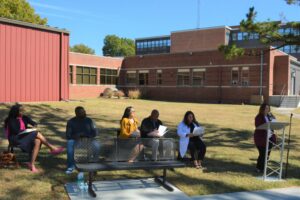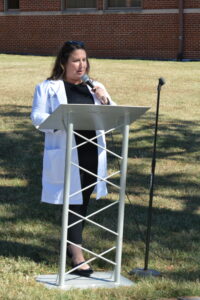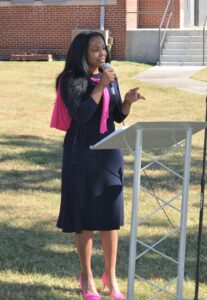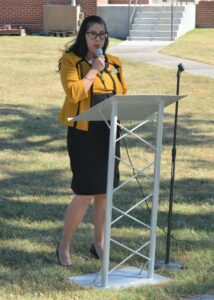UAMS Northwest Regional Campus Addresses Racial Inequities in Health Care at White Coats for Black Lives Event

[ad_1]
| Students, faculty and employees gathered on the lawn by the North Street Clinic on the UAMS Northwest Regional Campus in Fayetteville to voice opposition to disparities and structural racism in health care and to hear about UAMS and community initiatives to address health care disparities and equity in the Northwest Arkansas region. The attendees also heard a patient perspective on health equity and social justice.
The event, which took place at noon Oct. 21 was part of the nationwide White Coats for Black Lives coalition. A similar event took place on the main UAMS campus in Little Rock a few weeks earlier.

Amy Wenger, MHSA, vice chancellor of the UAMS Northwest Region, welcomed faculty, staff and students to the event.
Amy Wenger, MHSA, vice chancellor of the UAMS Northwest Regional Campus, opened the event by reading the mission statement of White Coats for Black Lives: “The mission of White Coats for Black Lives is to dismantle racism in medicine and promote the health, well-being and self-determination of Black and Indigenous people, and other people of color.”
“This aligns with the UAMS mission of caring for all people — regardless of race, sexual orientation or religion — and of delivering quality, equitable care across the state,” Wenger concluded before introducing the speakers.
Hershell West, a research program director in the UAMS Office of Community Health & Research, spoke about looking at racial disparities through a different lens.
West has more than 26 years of experience directing programs and providing effective strategies to empower youth and adults with disabilities to overcome barriers, disparities and inequalities within their schools, communities and workplace.
“I must warn you. Since I work in the Office of Community Health & Research, I will have a few stats,” West joked.
West said that according to the Brookings Institute, about half of the 30 million uninsured Americans are people of color. Before the Affordable Health Care Act, one in three Hispanics was uninsured, and one in five Blacks was uninsured. In addition, Black mothers are three times more likely to die in childbirth than white mothers are. They are also less likely to have access to prenatal care.
According to April 2021 data from the Robert Wood Johnson Foundation and the Urban Institute, West continued, 10% of Black patients recorded discrimination during a health care encounter.
“As a person of color, if you live in the U.S., that correlates to poor health outcomes,” West said. “What may go through a person’s mind if they are concerned about how they will be treated if they seek health care? When you think about the lack of cultural competency and respect that a person of color may experience seeking medical services, it can dissuade entire communities from seeking care.”
West applauded UAMS for striving to address and eliminate health disparities. He noted the institution’s numerous pipeline programs, such as the UAMS Pathways Academy, which is providing statewide K-12 health care education to build up a future workforce representative of the communities that they live in.
West praised the UAMS Northwest team in particular for its work in health literacy, diabetes prevention and management, family wellness, youth outreach, healthy food systems, pregnancy and prenatal health, fatherhood mentoring programs and the community health worker network, which has hired and engaged more than 200 community health workers across the state.
“We are talking to the people who are experiencing these disparities,” West said. “We are talking to them about their barriers, about their challenges. We’re not making assumptions. We’re going into their communities. We’re sitting down with them, talking with them.”
Stacy Harper, founder of Light House Solutions, a nonprofit organization helping to improve the quality of life for children, teens and families living in underresourced communities of Northwest Arkansas, offered a personal and unique patient perspective.
Diagnosed with Stage 2 breast cancer during the height of the COVID-19 pandemic, Harper found herself engaged with a health care system that she described as “lacking.”
“There is one word I want you to focus on today,” Harper said. “That word is lack. You’re going to hear this term throughout my cancer story. I picked this word because I have witnessed so much lacking from systems and humans, especially as it relates to women, and in my case, a Black woman.”
At the time of her diagnosis, Harper was a single mother running a nonprofit and trying like so many others to keep the doors open so she could continue to help the people of Northwest Arkansas.
“But little did I know that the universe had other plans for me,” Harper said. “Plans that would test my faith, my courage, my will, my compassion and my purpose.”
Harper said that her cancer journey opened her eyes to how much “lack” there is, particularly in the health care world of treating women of color. She cited a lack of resources, information, respect, empathy, trust, consideration and emotional intelligence.
Harper, who is now cancer free, said that according to the American Cancer Society, 41% of Black women are more likely to die of breast cancer than white women.
“This should make us stop in our tracks,” she said. “There are too many disparities when it comes to cancer and Black women. It’s time to remove health disparities that fall under social economic, genetic and systemic racism.”
Layza Lopez-Love, commissioner of the Arkansas Minority Health Commission (AMHC), spoke about the unique situations faced by immigrant and multistatus families and how Northwest Arkansas community organizations are working to reach Hispanic families.
The mission of the AMHC is to ensure that all minority Arkansans have equitable access to preventative health care and to seek ways to promote health care and prevent diseases and conditions that are prevalent among minority populations.
The AMHC is working to achieve this vision by addressing the disparities in minority communities, educating these communities on healthier lifestyles, promoting awareness of services and accessibility within our health care system, and most importantly, making recommendations to relevant agencies, the governor and state legislatures.
“Specifically for me,” Lopez-Love said, “in my role as commissioner and as a partner with UAMS, my focus and my goal has been to bring equitable access to education, resources, testing and vaccines during the COVID-19 pandemic, specifically to the Latinx and immigrant communities in Northwest Arkansas.”
At the beginning of the pandemic, Lopez-Love started the Northwest Arkansas Latinx COVID-19 Task Force to help talk through what needed to happen to eliminate some of the structural barriers to health care.
The result was a series of UAMS pop-up vaccination events. UAMS, with the help of community partners, travelled into the community and provided vaccine events in convenient locations and times for the Hispanic community.
The events took place on the weekends or after work, and Lopez-Love praised the UAMS employees and community partners who sacrificed their evening hours and their weekends in order to make vaccines available to the community.
“The message I want to drive home is the importance of meeting people where they are and working together to brainstorm and get creative,” said Lopez-Love. “We cannot move the needle in eliminating health disparities for minority populations without that intentional action. How are you partnering, who are partnering with, and how are you going to reach the most vulnerable?”
Sarah Assem, M.D., associate program director of the UAMS-Mercy Hospital Internal Medicine Residency program, spoke about various programs that are underway at UAMS and ways to get involved.
“We know that people affected by structural racism have been dealing with this for centuries,” Assem said. “Although we have a lot of good programs underway, we as a medical society and as a society in general are nowhere near making the impact that we need to.”

Sarah Assem, M.D., associate program director of the UAMS-Mercy Hospital Internal Medicine Residency program
Assem said that one good way to get involved is by joining in with the activities of the Division for Diversity, Equity and Inclusion (DDEI) Northwest Arkansas committee, which is chaired by Britni Ayers.
The Northwest Arkansas branch of the UAMS DDEI has the following subcommittees:
- Veterans
- Faculty
- Communications
- Student
- LGBTQIA+twin spirit
- Staff
- Disability
The program closed with a moment of silence.
“The CDC has declared racism a public health crisis,” Wenger said following the moment of silence. “UAMS consistently works to dismantle all barriers to care with the explicit mission of delivering quality, equitable care across the state. Thank you all for joining us today in standing against racism, as we all have a role in achieving equity for all.”
[ad_2]
Source link




